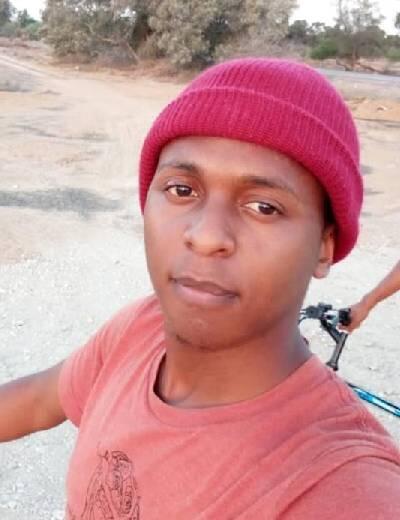Getting your Trinity Audio player ready...
In a small village in the Rombo region of Tanzania, near the Kenyan border, Felix Mtenga made a heartfelt request to members of the Imagine Israel Africa association: to choose a Hebrew phrase to inscribe on the gravestone of his late son, Clemence Mtenga.
Clemence, just 22 years old, was brutally murdered outside his room at Kibbutz Nir Oz on October 7, only three weeks after arriving in Israel. He had come to study agriculture as part of a program aimed at improving his family’s financial situation. Clemence was one of 260 Tanzanian students participating in an agricultural training initiative as part of a cooperation program between Israel and Tanzania.
Felix Mtenga reflects as he listens to the song that inspired his son's gravestone inscription
The association fulfilled the grieving father’s request, selecting a verse from the Book of Deuteronomy:
"When you besiege a city for a long time, making war against it in order to capture it, you shall not destroy its [fruit-bearing] trees by swinging an axe against them; for you may eat from them, and you shall not cut them down. For is the tree of the field a man, that it should be besieged (destroyed) by you?"
Get the Ynetnews app on your smartphone: Google Play: https://bit.ly/4eJ37pE | Apple App Store: https://bit.ly/3ZL7iNv
On that fateful Saturday—his day off—Clemence chose to remain at the kibbutz. Initially feared to have been taken hostage, his body was later found outside his room and identified 41 days later through DNA testing.
2 View gallery


'For is the tree of the field a man': Clemence Mtenga headstone bears a Hebrew inscription from the Book of Deuteronomy
(Photo: Courtesy)
Liraz Madar, a board member of the association and coordinator of delegations to Tanzania, visited the bereaved family. “The family received us warmly, with immense respect and gratitude,” she wrote in an emotional Facebook post. “The father is a hardworking man who raised successful, educated children.”
Honoring Clemence’s legacy
The association has committed to supporting the Mtenga family, who are now receiving a victims-of-terror stipend from the State of Israel, and to memorializing Clemence in his home village and the schools supported by the association. “We promised to establish an excellence fund in his name so that every delegation promoting excellence in various fields will award prizes to two outstanding students,” Madar explained.
As early as October, two seventh-grade students received a mathematics excellence scholarship in Clemence’s memory, and two more students are expected to receive the scholarship in April.
“The phrase inscribed on the gravestone comes from the Book of Deuteronomy,” Madar elaborated. “One interpretation is that it is forbidden to harm an innocent person, just as it is forbidden to harm a tree that bears fruit and is not part of the conflict.”
A father’s faith
Clemence’s father, a devout Christian, shared a moving perspective: for his family, Clemence has returned to his ancestors in Israel, and they believe his death in Israel was no coincidence.
Recently, Felix, who now works as a welder for the association, sent a photo of the gravestone with the Hebrew inscription prominently displayed. “The verse from Deuteronomy 20:19-20 reminds us of the sanctity of life,” Madar emphasized. “It highlights the principle that one must not harm the innocent, just as one must not harm a tree that is uninvolved in the conflict.”
“I cannot explain the odds that, out of 65 million people, the student who was killed happened to be the son of a man known to our association, in a village where we volunteer,” Madar reflected. “The pain of October 7 transcends continents and religions. I hope this tragedy will come to an end, that the hostages will return, the war will cease, and we will find a way to heal and grow from what remains.”






